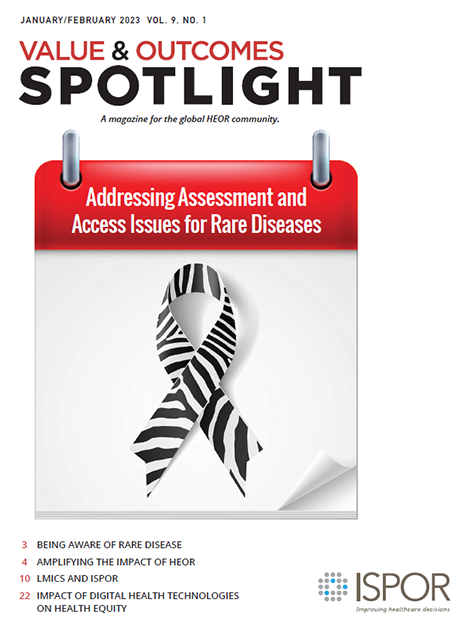HEOR News
 New “Artificial Pancreas” Technology Set to Change the Lives of People Having Difficulty Managing Their Type 1 Diabetes (NICE)
New “Artificial Pancreas” Technology Set to Change the Lives of People Having Difficulty Managing Their Type 1 Diabetes (NICE)
In a draft guidance, an independent NICE committee recommends the use of hybrid closed-loop systems for managing blood glucose levels in type 1 diabetes—technology that has been described as a step towards an artificial pancreas. Read more
 Patient Perspectives on Technology-Based Approaches to Social Needs Screening (American Journal of Managed Care)
Patient Perspectives on Technology-Based Approaches to Social Needs Screening (American Journal of Managed Care)
In trying to understand patient perspectives on completing social needs screening through technology-based modalities such as portals and tablets, researchers found that patients were broadly accepting of screening and recognized the connection between social needs and health. Read more
 Chatbots Are Effective in Supporting Self-Management of Depression Symptoms (MobiHealthNews)
Chatbots Are Effective in Supporting Self-Management of Depression Symptoms (MobiHealthNews)
A study from the Lee Kong Chian School of Medicine at Nanyang Technological University Singapore examining 9 mental health chatbots found that the chatbots’ coach-like encouragement can help people manage some depression symptoms even though they cannot yet offer personalized advice. Read more
 Financing and Funding Gap for 16 Vaccines Across 94 Low- and Middle-Income Countries, 2011–2030 (Health Affairs)
Financing and Funding Gap for 16 Vaccines Across 94 Low- and Middle-Income Countries, 2011–2030 (Health Affairs)
Researchers found a total funding gap of $38.4 billion between 2011 and 2030 for 16 vaccines among 94 low- and middle-income countries. The decline in development health financing assistance anticipated between 2011 and 2030 outpaces the forecasted increases in domestic government immunization spending. Read more
 Scientists Are Finding Increasing Evidence for a Link Between Air Pollution and Neurodegenerative Diseases Like Alzheimer’s (STAT News)
Scientists Are Finding Increasing Evidence for a Link Between Air Pollution and Neurodegenerative Diseases Like Alzheimer’s (STAT News)
Population studies from around the world increasingly show that there is a connection between air pollution and brain atrophy and cognitive disorders. The superfine particulates in air pollution have been linked to inflammation, cancer, and severe cardiac and respiratory diseases, as well as neurodegenerative diseases. Read more
 Statins Could Be a Choice for More People to Reduce Their Risk of Heart Attacks and Strokes, Says NICE (NICE)
Statins Could Be a Choice for More People to Reduce Their Risk of Heart Attacks and Strokes, Says NICE (NICE)
While in its updated guidance NICE did not change the cardiovascular disease risk threshold for offering statins, the organization did say the drugs could be an option for people at a lower risk, depending on patient preference or concerns that the patient may be underestimating their risk of cardiovascular disease. Read more
 WHO Updates COVID-19 Guidelines on Masks, Treatments, and Patient Care (World Health Organization)
WHO Updates COVID-19 Guidelines on Masks, Treatments, and Patient Care (World Health Organization)
WHO says irrespective of the local epidemiological situation, masks should be worn following a recent exposure to COVID-19, when someone has or suspects they have COVID-19, when someone is at high risk of severe COVID-19, and for anyone in a crowded, enclosed, or poorly ventilated space. Read more
 Super-Resistant Mosquitoes in Asia Pose Growing Threat, Study Says (The Japan Times)
Super-Resistant Mosquitoes in Asia Pose Growing Threat, Study Says (The Japan Times)
An examination of mosquitoes from several countries in Asia and Ghana found a series of mutations had made some of the bugs—particularly those in Cambodia and Vietnam—virtually impervious to popular pyrethroid-based chemicals like permethrin, thus increasing threats from mosquito-borne diseases such as dengue, zika, and yellow fever. Read more
 In China, No Easy Way to Get Pfizer’s COVID Drug Paxlovid (The Japan Times)
In China, No Easy Way to Get Pfizer’s COVID Drug Paxlovid (The Japan Times)
Local media reports and online posts bear testimony to the difficulties faced obtaining Paxlovid (nirmatrelvir tablets; ritonavir tablets) in China through official channels, even as Pfizer has shipped millions of doses to that country in the past couple of weeks. Read more
 WHO Welcomes Data on COVID-19 in China, Meeting With Minister (World Health Organization)
WHO Welcomes Data on COVID-19 in China, Meeting With Minister (World Health Organization)
In its initial analysis of more detailed data about COVID-19 infections provided by Chinese health authorities, WHO notes that the overall epidemiology is similar to waves of infection experienced by other countries, as is the increased pressure on health services.
Read more

